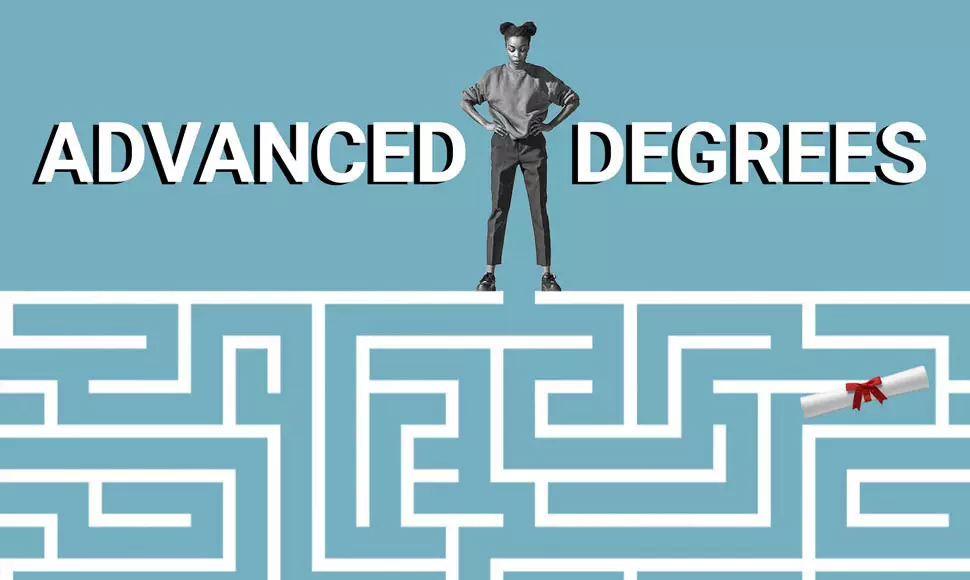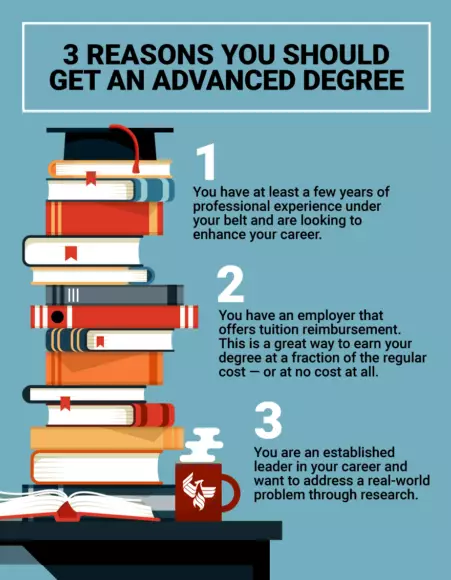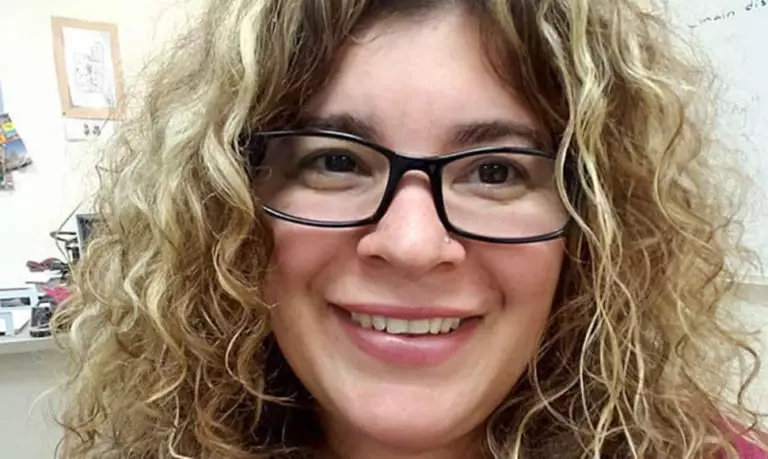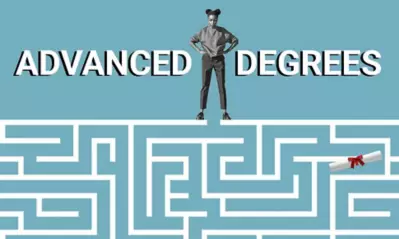You got your bachelor’s degree. Now here are 3 reasons you should you get a graduate degree.

By Elizabeth Exline
At a glance
- Graduate degrees are ideal for professionals looking to take enhance their careers, and for established leaders who want to contribute to the knowledge of their field.
- Employer tuition assistance and competency-based education are ways to earn a degree for less.
- University of Phoenix offers a variety of graduate degrees, including 26 master’s programs, five doctorate programs and 15 graduate certificate options in subjects as varied as cybersecurity, finance and healthcare.
Investing in education
When Isabel Alonso decided in 2013 that a graduate degree would be necessary to enhance her career, she had given the idea a lot of thought. She loved her teaching job at a private language school in New Jersey, but she didn’t see any opportunities for further growth. However, to move to other schools or colleges, she says, she had to first invest in her own education. And that meant earning a Master of Arts in Education (MAEd).
Alonso was working full-time and would continue to do so while pursuing her master’s degree. She was also a mother to two daughters who were 2 and 4 years old at the time. So, flexibility was important, but it was not the most important factor: More than anything, Alonso wanted a program that would confer the right skills and knowledge for her desired career path.
Ultimately, her search brought her to University of Phoenix (UOPX) where the Master of Arts in Education/Adult Education and Training program offered the kind of professional foundation she was looking for. And her experience is not unusual, says Provost John Woods. The "applied nature" of the University’s programming appeals to people "looking to hold the most senior-level positions in their fields," he explains.
Graduate degrees for the real world
With 26 master’s programs, five doctorate programs and 15 graduate certificate options, UOPX answers the call for higher education in a variety of fields. The University goes beyond theory (although students will find that, too) to develop skills-aligned graduate programs.
UOPX has recently begun to work with industry councils and Emsi, a specialist in labor market and economic data analytics, to ensure that students who put in the time and effort to learn in each class walk away with skills that can be implemented immediately in the workplace.
Complementing the University’s graduate programs are its certificate offerings, which provide a pathway toward deeper knowledge in a specialized area of study. These are available online and in a variety of fields including technology, healthcare and business.
"The curriculum and the applied nature of the programs, in combination with the peers that [students] sit with, create a really powerful, professional environment," Woods observes.
When it might be time to pursue a graduate degree
Deciding to pursue a graduate or postgraduate degree is a personal decision, sure. But there are a few ways to determine when it might be the right choice for you.
Option 1: You have at least a few years of professional experience under your belt and are looking to enhance your career or move into a leadership role. "A graduate degree can be a real differentiator [in that case]," Woods says.
Option 2: You have an employer that offers tuition reimbursement. This is a great way to earn your degree at a fraction of the regular cost — or at no cost at all. (This is especially true when combined with a competency-based degree, which can be completed faster.) UOPX, for example, has formed educational alliances with 1,500 different employers by offering reduced tuition to their employees.
Option 3: You are an established leader in your career and are "looking really to leave an even greater mark through research that addresses a real-world problem," Woods says.

The master’s experience
Marian Toronka, CEO and owner of GoodHeart Nursing Care, LLC in Maryland, fell into the first of the three categories listed above. As a trained nurse, she initially thought she’d pursue a Master of Health Administration . She had colleagues who’d spoken highly of the graduate programs at UOPX, and she began to research whether one might answer her needs.
"I was trying to figure out which degree would give me the most bang for my buck," she recalls. She smiles at the phrase, but she is dead serious about the intent. As a working nurse, wife and mother, she wanted to get the most out of whichever degree program she decided to commit her time to.
Finding the right MHA program
Toronka’s company, GoodHeart Nursing Care, was just a dream at that point. Toronka knew she’d have to expand her knowledge not just in healthcare policies but also business principles if she were to make that dream a reality. "That’s when I ran into the MHA/MBA program ," she says.
The Master of Health Administration/Master of Business Administration (MHA/MBA) program takes approximately two-and-a-half years to complete, but it covers both healthcare administration and foundational business practices.
While the MHA/MBA is its own degree program, Woods points out that the MBA and MHA are, respectively, two of the University’s most popular options. Part of this can be explained by longevity, Woods says: The MBA was one of the first programs offered at UOPX.
(The MBA is also available as a competency-based degree, meaning each credit is tied to a measurable skill so that students can progress through the program as they demonstrate their knowledge of core skills.)
But part of it is also its utility. The MHA, Woods says, is programmatically accredited and taught by "very knowledgeable and respected healthcare [professionals]." The program also uniquely emphasizes empathy with its focus on storytelling — skills, Woods notes, that are in-demand in the industry.
For Toronka, the MHA/MBA was a gamechanger. She says: "I realized that, even though I’m a nurse, I didn’t really know much about how the healthcare industry worked."
So Toronka set to work. She learned how to write a business plan and spot-check vulnerabilities. She learned about healthcare policies and how to create them. "Most of what I’ve learned, I use," she says.
This supports Woods’ observation that master’s students tend to be surprised with "the currency of the curriculum" — because UOPX faculty actively work in the fields they teach, they follow a curriculum that reflects current issues.
Learning to learn online
Just as important as the lessons was the format: Online school was a new experience for Toronka. She quickly learned that discipline was the key to survival.
"You have to be structured," she says. "There’s no way to succeed if you aren’t."
On Sundays, Toronka would review her coursework and plan her assignments for the week. She’d wake up three or four hours before her children did so that she could complete her reading and her posts without interruptions. She switched to a weekend and holiday nursing schedule at the hospital where she worked, and she began building GoodHeart Nursing Care, which today specializes in skilled residential nursing for pediatrics and adults.
Then COVID hit, and Toronka had to pick up shifts during the week. She thought about stepping away from her studies. "But something in me just said, ‘Keep going. You’re on your last year. Keep going,’" she recalls.
She pressed on, juggling three children, two jobs, a marriage and a master’s program. "You want it bad enough, you figure it out along the way," she says with a small laugh.
Toronka successfully completed her program in February 2021.
The doctorate experience
Like Toronka, Alonso found considerable value in the master’s program at UOPX. So much so that, three months after she earned her Master of Arts in Education/Adult Education and Training, she went back for her Doctor of Education (EDD) in Educational Leadership/Educational Technology.
"We have a huge number of teachers who get their degrees at UOPX and get their EDD to become superintendents," Woods observes.
But for Alonso, the carrot at the end of this 38-month, programmatic stick wasn’t an administrative role so much as it was the joy of learning. Yes, she wanted to enhance her career, but she also found that she thrived in the online graduate and postgraduate environment.
"Everything was, for me, from day one, perfect," the Cuban-born Alonso enthuses. "I always implemented what I was learning. My job is my playground."
By way of example, Alonso rattles off a number of skills she learned during her graduate studies and routinely applies to her work today. As an instructor of several subjects at multiple schools, she develops curriculum, she understands how structural design gets applied to courses, she assesses different programs, she teaches, she mentors. During the pandemic, she helped set up online classrooms and train teachers. In what is possibly the greatest compliment of all, her boss, she says, wants "to borrow her brain."
All of this was possible because of the practical knowledge Alonso gained in her graduate and postgraduate degrees. As Woods notes, this commitment to skills-based training extends from bachelor’s programs all the way through to doctoral programs. Even dissertations, Woods says, address "problem-solving topics." Students contemplate existing problems in their fields (like African American female leadership in school districts, for example) and use their dissertations as opportunities to apply their knowledge toward a solution.
Making it work
Alonso’s enthusiasm for learning should not be misinterpreted as glib. Earning her doctorate was worth it, but it wasn’t easy. She had small children, she was working full-time and she was caring for her mother who was ill. Between work, family responsibilities and cooking for and visiting her mother daily, Alonso wouldn’t get to her schoolwork until the evening and routinely found herself completing assignments by 1 or 2 a.m. She successfully concluded her Doctor of Education online in March 2021.
Alonso recognizes how online learning fit her unique abilities and preferences. (As an educator, after all, she is well-versed in adult learning theories.) The instructor feedback and class discussions she experienced at UOPX, she says, amplified what she took away from the lessons.
This corroborates Woods’ observations about the level of support UOPX offers its doctoral students. Recently, the University implemented a new protocol whereby doctoral candidates are assigned a research methodologist and dissertation chair. The university also hired about 50 year-round faculty who are committed to teaching courses and chairing. These dedicated resources, he says, exist to ensure the success of doctoral candidates.
Committed to higher education
Alonso takes a similar approach with her own students. She is there to impart knowledge and to support her students, she acknowledges, but they have to bring the will to see it through.
Alonso says: "I tell my students, ‘If I can do it, why can’t you do it? The only difference is commitment.’"
And where that commitment comes from matters. For Alonso, it’s her passion for learning. For Toronka, it was making a dream come true. After all, to stay the often-bumpy course of graduate and postgraduate study, Alonso notes that "you have to go where your passion is. [You have to] stay committed to that and keep your motivation." The reward is well worth it.
You don’t have to go it alone. Learn how one UOPX instructor champions the efforts of her doctoral students.
Get started on your master’s or doctorate degree at University of Phoenix!
want to read more like this?




